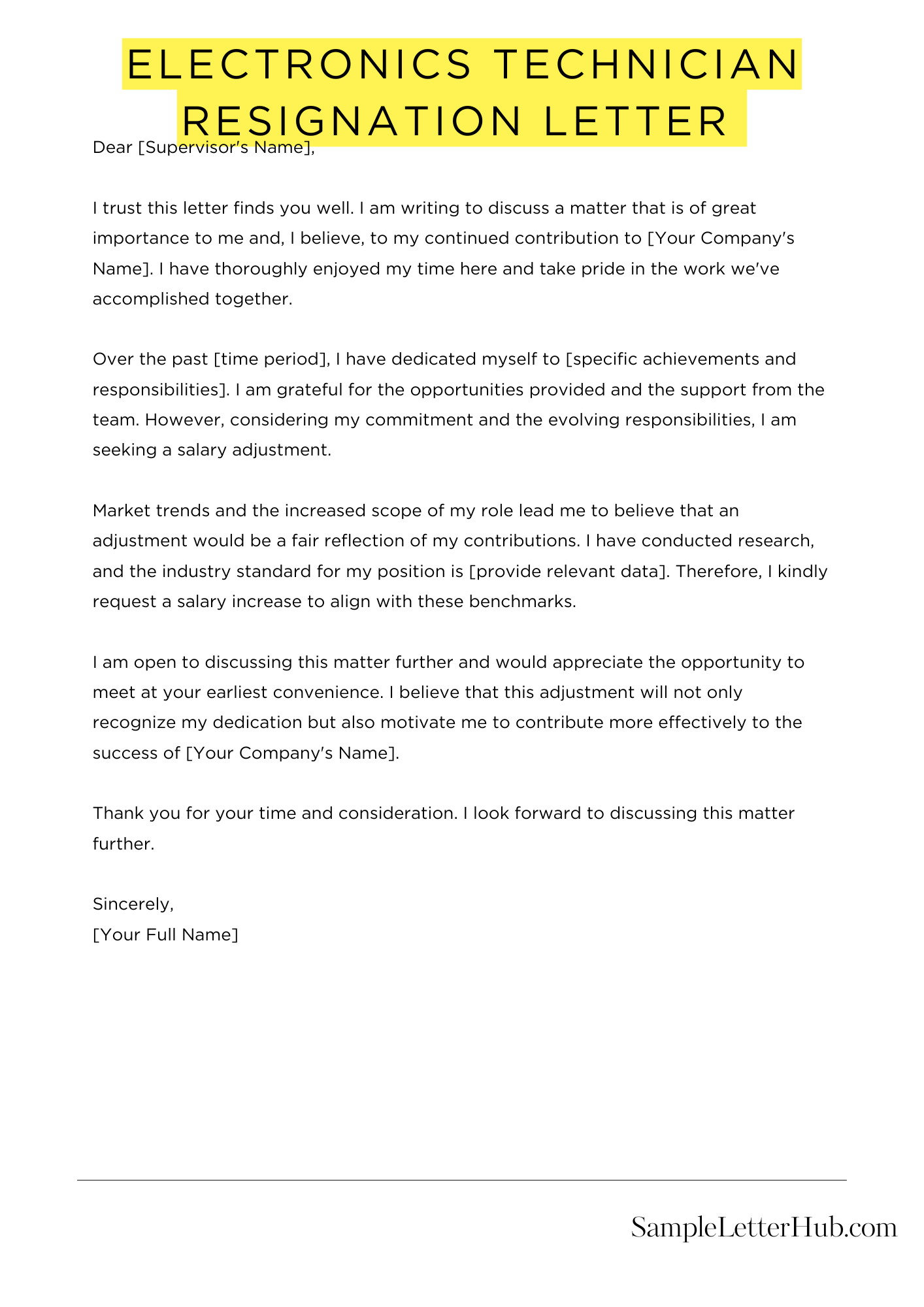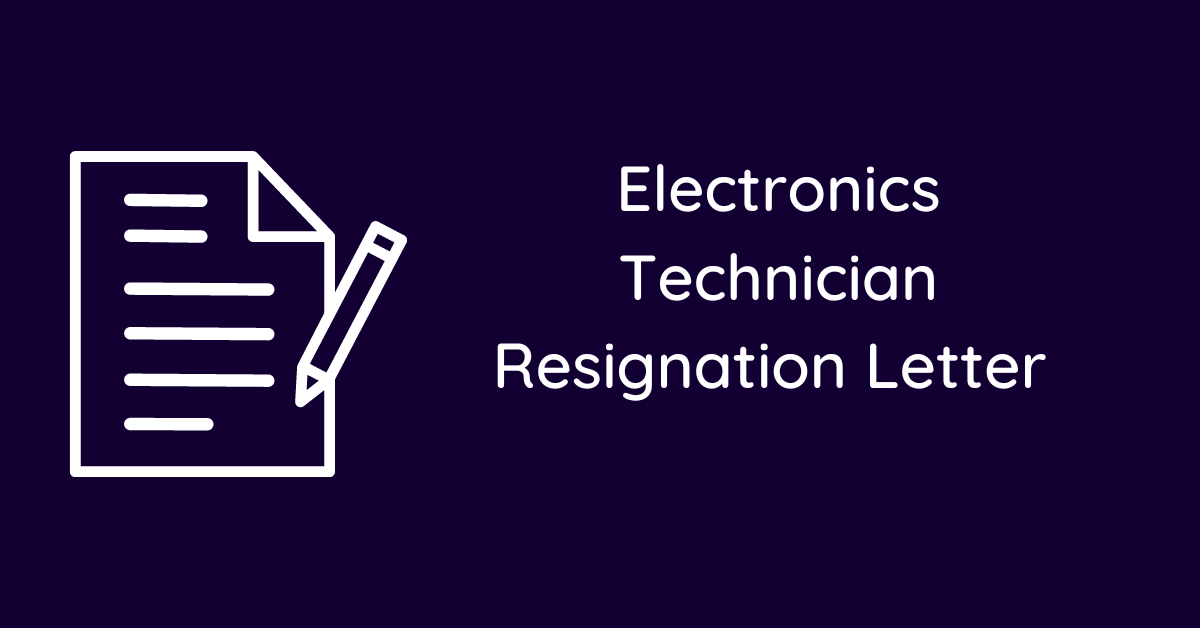If you’re an electronics technician who’s decided to move on to new challenges, you’ll need to write a resignation letter. In this blog post, we’ll share an example of an electronics technician resignation letter that you can use as a template.
When writing your resignation letter, it’s important to be clear and professional. Explain your decision to leave, and be polite and humble in your tone. You want to leave a good impression, even though you’re moving on.
Below, we’ve shared a template/example electronics technician resignation letter that you can use. Feel free to adapt it to your own needs.
Electronics Technician Resignation Letter
Dear [Manager’s Name],
Please accept this letter as formal notification that I will be resigning from my position as Electronics Technician at [Company Name], effective two weeks from today, [Last Date of Employment].
During my time with the company, I have gained valuable experience and knowledge in the field of electronics. I am grateful for the opportunities I have been given and the support I have received from my colleagues.
I wish you and the company all the best in the future.
Sincerely,
[Your Signature]
Short Electronics Technician Resignation Letter Sample
Please accept this letter as formal notification that I am resigning from my position as Electronics Technician at [Company Name]. My last day of employment will be [Your Last Day]. Thank you for the opportunity to grow and learn during my time here. I wish you and the company continued success. I am happy to assist in the transition process to ensure a smooth handover of my responsibilities.
I wish you all the best with your electronics technician resignation letter.
When it’s time to say farewell, expressing your gratitude and best wishes can make the transition smoother:

How to Write an Electronics Technician Resignation Letter
Leaving a job can be a nerve-wracking experience, especially when you’re in a specialized field like electronics. But with the right approach, you can write a resignation letter that leaves a positive impression and sets you up for success in your next role.
1. Start with a Formal Opening
Begin your letter with a formal salutation, such as “Dear [Manager’s Name].” This sets a professional tone and shows respect for your manager.
2. Express Your Gratitude
Take a moment to express your gratitude for the opportunities and experiences you’ve gained during your time at the company. This shows that you value your time there and appreciate the support you’ve received.
3. State Your Resignation
Clearly state your intention to resign from your position as an Electronics Technician. Include your last date of employment to provide ample time for a smooth transition.
4. Offer Assistance
If possible, offer to assist with the transition process. This could include training your replacement or providing documentation on your projects. This shows that you’re committed to leaving the company in a good position.
5. Close with a Professional Tone
End your letter with a professional closing, such as “Sincerely,” or “Best regards.” You can also include a personal touch by expressing your best wishes for the company’s future success.
6 Most Frequently Asked Questions About Electronics Technician Resignation Letters
Resigning from your position as an electronics technician can be a daunting task. To help you navigate the complexities of writing a resignation letter, here are the six most frequently asked questions and their answers:
1. What is the proper format for an electronics technician resignation letter?
Your resignation letter should be formal and concise. It should include your name, address, date, the company name, and the company address. Start with a brief statement expressing your intent to resign, followed by your last date of employment. State your appreciation for the opportunity to work at the company and offer to help with the transition.
2. What should I include in the body of my resignation letter?
In the body of your letter, you can briefly state your reasons for leaving. Keep it professional and avoid being negative or critical. You can also express your gratitude for the experience and support you received during your time at the company.
3. How much notice should I give?
The amount of notice you should give depends on your company’s policy and your relationship with your employer. Generally, two weeks’ notice is considered standard, but you may want to give more if you have a particularly close relationship with your boss or if your position is difficult to fill.
4. Can I negotiate my end date?
In some cases, you may be able to negotiate your end date with your employer. This is especially common if you have a specialized skill set or if your company is short-staffed. Be prepared to be flexible and willing to compromise.
5. What should I do if I’m not sure what to write?
If you’re struggling to write your resignation letter, you can seek help from a career counselor or online resources. There are also many templates available online that you can use as a starting point.
6. What are some common mistakes to avoid?
Some common mistakes to avoid when writing a resignation letter include:
- Being vague or unclear about your intentions
- Being negative or critical of the company
- Making personal attacks
- Offering too much information
- Not proofreading your letter before submitting it
Before making the decision to resign from your job, it’s essential to consider the legal aspects:
Understanding your emotions after quitting your job is important. Explore why you might be feeling sad:
Related
- Resignation letter sample
- Forced resignation letter
- Resignation letter due to going abroad
- Resignation letter due to marriage
- Resignation letter due to other opportunity
- Resignation letter due to mistake

